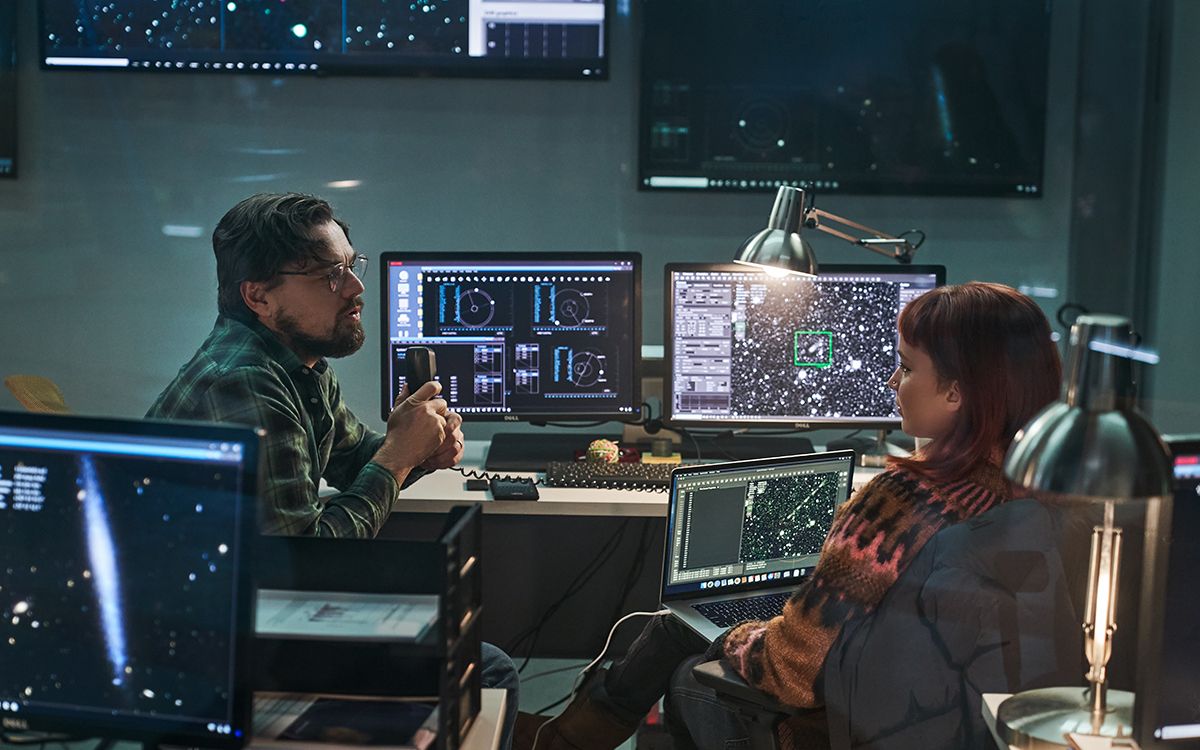If you'd asked me last year if a climate change satire could become the second most-watched movie in Netflix history, I wouldn't have believed it. But that's exactly what Netflix's new film, the dark comedy Don't Look Up, has done.
In case you haven't had the chance to watch it (don't worry, no spoilers!) the filmmakers use an impending arrival of a planet-killing comet – and the public’s all too familiar reactions – as an allegory for climate change:
- Billionaires promise technology and capitalism will save us.
- A president who is more concerned with polling and corporate profits than our future.
- The media twists the truth and ignores scientists’ warnings.
- A confused public amplifying outlandish conspiracy theories
These not-so-subtle real-world reflections on the climate crisis were peppered through Don't Look Up, which was more 'funny because it's true.'
A comet – as a singular cause of demise – may not be the best representation of the complex challenge of climate change. We all know that one click of a button or a single government solution won't fix our climate crisis. One thing the film didn’t show is a coordinated, mobilized, powerful social movement rising up to demand action, which we know is critical to solving the overlapping crises we're in.
But the film's message was clear. We must stop ignoring the reality of the climate crisis – and act now.
We know it's critical to keep up the pressure on our leaders for systemic solutions. Our communities and our climate cannot wait any longer. Help us continue to mobilize people across the nation, demand our senators pass the Build Back Better Act, and ensure historic climate action this year by becoming a Sierra Club monthly member today.
The dismay, anger, and outrage that the scientists, played by Leonardo DiCaprio and Jennifer Lawrence, feel in the face of the impending planet-destroying comet is what many of us have been feeling for years in the face of a worsening crisis.
The overwhelming response I've seen from my community and colleagues is recognition. We feel seen. We've been those scientists, advocates, and concerned community members screaming at the media, corporations, and our governments to "look up" already! To please, take action already. And while the conversation about the climate crisis has shifted significantly in recent years, their responses are woefully insufficient.
Don't Look Up's director, Adam McKay, hopes the film will be "a kick in the pants" that prompts urgent action on climate change and "[inspires] conversation, critical thinking, and make people less tolerant of inaction from their leaders."
But what exactly will that mean? The majority of us in the United States are already concerned about climate change, and two-thirds of us think our government isn't doing enough to address the problem. What we need is for every one of us to vote, push our legislators locally and nationally, talk to friends and family about the climate crisis -- check out our Don't Look Up discussion guide here -- make climate-friendly life changes where possible, and make our voices heard at actions and events when able.
The reactions to Don't Look Up have been varied, to say the least – quite a few people missed the point entirely, while others called it essentially a documentary. But one thing is for sure: We need more people talking about the climate crisis and climate action. If this film makes that happen, then it has achieved something.
There will be no avoiding catastrophic impacts of planetary warming. Over the last couple of weeks, we've seen more manifestations of the crisis we're in: Intense storms leading to tornadoes across the Southeast, wildfires devastating a community in Colorado, and, for most of the country, a dramatic swing from near-record warmth to frigid conditions.
Don’t Look Up’s comet would create equal devastation in the lives of everyone on earth. But in our real-world crisis, the people with the least money and power are already being disproportionately harmed by climate change. Far too many of our communities, disproportionately Black and Brown and frontline, are already facing heatwaves, fires, floods, storms, and other disasters. And far too many in power choose to sacrifice the people with the least access and ability to fight back.
However, over the last years, we've built significant grassroots power, which you can help us continue to strengthen, that has enabled us to win campaigns, achieve tangible outcomes for those most impacted by systemic injustice, and build power beyond electoral cycles so that all people can explore, enjoy, and protect people and the planet.
As we enter 2022, we must resolve to keep on pushing in this new year. We must not give in to cynicism. We've come too far, and our movement is too strong to give up now. This is the year that the United States turns the corner. Congress must pass the historic and unprecedented climate crisis-fighting Build Back Better Act.
Let this film be a cautionary tale. Our leaders have delayed too long, and their inaction threatens everything we love. As Leonardo Dicaprio’s character says in the film's final line. "We really did have everything, didn't we?" And we do. We have each other. We have community. We have the solutions at our fingertips to create a just and livable future for everyone.
Thank you for being a part of our work to fight for that vision. Don't forget to use our Don't Look Up discussion guide to bring more of your friends and family into this movement.
